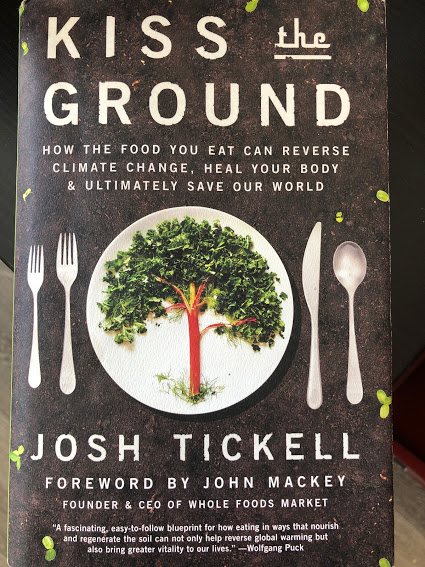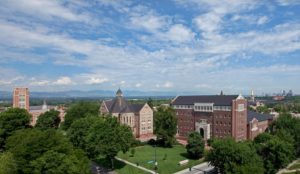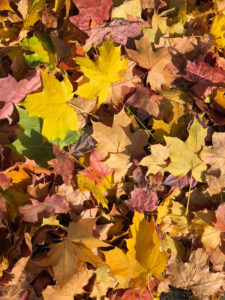When we told my parents we were finally going to quit our jobs to pursue our dream of farming, they were a little surprised, excited about the possibilities, and looked for ways to support us. It wasn’t an entirely new concept as we’d been toying with the idea for some time and had talked about it happening sometime in the future. Still, it’s not every day you announce such a major life change…
A few weeks later my parents sent a fun package containing several books for the entire family – a guide to beekeeping with great illustrations for the kids and Kiss the Ground by Josh Tickell for Steve and I. While Steve read the book immediately and would read sections he found particularly interesting to me before bed, I added it to my list of books to read “someday.” And that’s a long list.
A book club in Manila?!
Living in a town of just over 300 people in a county with about 1000 residents, you can imagine my surprise when I learned there was a monthly book club! I’ve always loved reading and have been part of several book clubs over the years, so was thrilled to discover other women in town with similar interests. A book club is a great way to not only connect with friends (and meet new ones!), but to discover books I never would have discovered on my own.
What to read
In February the Manila book club read and discussed Emma by Jane Austen. A classic book I hadn’t read since high school and thoroughly enjoyed re-reading (although honestly I listened to most of it on an audio book as I did work around the house…the British accents made it that much more authentic). March continued the British theme, but this time we read The Sweetness at the Bottom of the Pie by Alan Bradley. It was a fun murder mystery starring an 11-year-old sleuth who is far too smart and cheeky for her own good. For April’s pick I suggested reading Kiss the Ground by Josh Tickell since it aligned well with the growing season (and would give me extra motivation to finally read it). The subtitle is “How the food you eat can reverse climate change, heal your body and ultimately save our world” – a slight divergence from our previous two books. I wasn’t sure how the group would respond since the topic of climate change and even the concepts of regenerative agriculture can be controversial…and I hadn’t even read the book yet to see how the author presented the topics!
Personal musings from the book
Overall I really enjoyed reading the book (as did my fellow members of the book club). Tickell interviewed notable farmers, politicians and scientists from all over the world and presented the information in a compelling manner. Many non-fiction books can come across as laborious, but he did a masterful job of weaving personal narrative with facts and figures about soil, chemicals and climate change. I received a solid history lesson showing the impact of World War II on our agricultural methods and was shocked and horrified to see that the same chemicals used to exterminate thousands of people in concentration camps is being used on our crops in conventional farming operations today! The fact that “conventionally farmed food requires three pounds of toxic chemicals per American per year” is astonishing…and a huge part of why we choose to raise our produce and poultry in the manner we do without the use of any toxic chemicals in the forms of pesticides, herbicides, fungicides and even synthetic fertilizers.
And the group's verdict?
Overwhelmingly the group found the book compelling, eye-opening and ultimately hopeful. Many people who write on this topic can be all doom and gloom. However, Tickell strikes a good balance between scaring you with the reality of how we are desertifying the soil, killing off the phytoplankton in the ocean and currently poisoning our food while still offering hope for change. He describes the immense potential for agricultural lands to sequester carbon in the soil through regenerative farming practices. This includes practices like keeping the ground covered with living plants, not tilling or using toxic chemicals, mimicking the biodiversity seen in nature, using ruminants in a holistic grazing model, etc. We really should write a whole other post just on regenerative agriculture and which components we have already started implementing on our own farm and how we continue to move further in that direction.
Lest you think we all had on rose-colored glasses when reading the book, there were a few assumptions and assertions we felt were a bit of a stretch. A few members of our book club even called up friends and colleagues with more expertise in particular areas to pick their brains about some of the claims presented. Two primary areas stood out as an overreach in his presentation. The argument that the desertification of the Middle East was the underlying cause of the social disintegration leading to the formation of ISIS was presented in a very black and white causal relationship, when the truth is likely more nuanced. Secondly, research on the ability of the soil to sequester carbon is still fairly limited, although it has attracted more attention in recent years. While the results look promising from initial research, there’s still much to learn in this growing field.
The last two chapters provide many tangible ideas about not only how to eat regeneratively, but also how to create a broader impact. I appreciate that he acknowledges it is a “general and continuing shift in what you eat and where it comes from” – it’s not going to be perfect all the time. But we can slowly and surely make a difference in what we consume and the impact those food dollars have in the world. More than anything, this book was a reminder and a confirmation that what we’re doing matters. How we’re farming matters. This lifestyle we’ve chosen to raise our kids in matters. And it can and will make a difference in the world.
What next?
Even though the list of books I’d like to read “someday” is long, I’m always interested in recommendations! Is there anything you’ve read recently that has impacted how you view the world? Or just a fun, light read for the summer? Any good ideas for future book club selections? I’m all ears!




Emily, excellent books I’ve recently read: There, There by Tommy Orange (fiction with a non-fiction prologue), Washington Black by Esi Erduyan, The Overstory by Richard Powers (winner of the Pulitzer for fiction this year), Becoming by Michele Obama, and Educated by Tara Westover (this is an amazing memoir by a young woman growing up in isolation in Idaho). And I’m about to re-read Jane Austen and now, inspired by you, Emma. Hugs, Margaret
Great recommendations Margaret! Educated is already on our list for later this summer – sounds intriguing. I received Becoming by Michelle Obama from the library at a time when I was in the middle of a few other books, so I had to return it before finishing…but I loved the portion I got to read! I’ll have to check out the others.